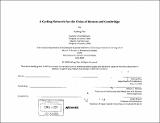A cycling network for the cities of Boston and Cambridge
Author(s)
Tian, Ruifeng
DownloadFull printable version (67.72Mb)
Other Contributors
Massachusetts Institute of Technology. Dept. of Architecture.
Advisor
William J. Mitchell.
Terms of use
Metadata
Show full item recordAbstract
In recent years, many cities have been looking for alternative urban transportation tools due to the high cost of energy and the global climate change. As one of the clean transportation types, cycling has become gradually noticed by many American cities. The cities of Boston and Cambridge have been promoting cycling for years and have started to lay more emphasis on it recently. This paper will propose a possible cycling network for the two cities to illustrate in general how to design a cycling network within an already built city. Firstly, the thesis briefly goes over the history of cycling, addressing the unpopular role of utilitarian cycling in American cities. Secondly, the thesis will review previous cycling planning theories and discuss different models of bicycle planning. In this part, it will also take the city of Davis, California as a case study, discussing the planning strategy of how to implement cycling in American cities. Thirdly, the thesis proposes a cycling network at three different scales: the urban scale, the community scale and the street scale. Conclusions of the design proposals and future suggestions are included in the last chapter.
Description
Thesis (S.M.)--Massachusetts Institute of Technology, Dept. of Architecture, 2009. Includes bibliographical references (p. 89-90).
Date issued
2009Department
Massachusetts Institute of Technology. Department of ArchitecturePublisher
Massachusetts Institute of Technology
Keywords
Architecture.